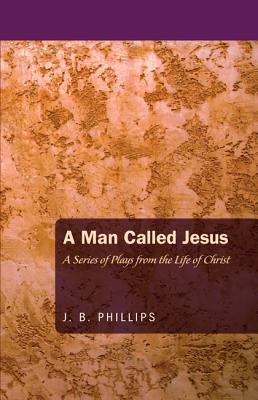- Bible
- Read the Bible
- Bible Versions
- Verse of the Day
- Reading Plans
- Verses by Topic
- Books of the Bible
- Bible Images
- Study
- Commentaries
- Concordances
- Dictionaries
- Encyclopedias
- Sermons
- Bible Atlas & Maps
- BP Wiki
- Devotionals
- Today's Devotionals
- Light of the World
- All Devotionals
- Inspirational Quotes
- More
- Picture Quotes
- Videos
- Inspirational
- Bible Study
- What The Bible Says
- Bible Q&As
- Daily Bread
- Bible by Genre
- Bible Stories
- Random Bible Verse
- Community
- Store
A Man Called Jesus: A Series of Plays from the Life of Christ
by J.B. Phillips
J. B. Phillips, best known hitherto for his widely acclaimed translation of the New Testament, has in this series of short plays about the life of Christ preserved the same direct speech and simple, dignified language that so distinguish his translation.The series starts with the first public appearance of the boy Jesus when he talks to the elders in the temple, and ends with a moving reconstruction of the crucifixion as witnessed by the soldiers, by Nicodemus, and bystanders.Written at the invitation of the BBC in England for their Schools Programme, these plays will be welcomed in book form by parents and children, as well as teachers. Schools, churches, clubs, and other groups will find them admirably suited to simple dramatization of some of the events in the life of the Man called Jesus. They will be especially satisfying to the individual reader who will find that this imaginative approach sheds new light upon familiar stories.Turn to Canon Phillips' helpful introduction for his interesting comments on the writing of the plays.
BUY NOW
Paperback, 141 pages
Published June 13th 2012 by Wipf & Stock Publishers (first published June 12th 2008)
© 2025 Bibleportal.com All rights reserved.

John Bertram Phillips was a Bible translator, writer and clergyman. Phillips was born in Barnes, Surrey. He was educated at Emanuel School and took a degree in Classics from Emmanuel College, Cambridge. He was ordained an Anglican clergyman in the Church of England in 1930.
His work translating the Bible made him one of Britain's most famous Bible communicators. Phillips also translated parts of the Old Testament. In 1963 he released translations of Isaiah 1-39, Hosea, Amos, and Micah. This was titled Four Prophets: Amos, Hosea, First Isaiah, Micah: A Modern Translation from the Hebrew. But, he did not translate any more of the Old Testament. He talked of the revelation he made as he translated the New Testament, describing it as "extraordinarily alive" unlike any experience he had had with non-scriptural ancient texts. He referred to the scriptures speaking to his condition in an "uncanny way" similarly to the way the author of Psalm 119 talks. Phillips was a masterful apologist and defender of the Christian faith. He upheld the basic tenets of the faith, and was able to present them fresh to the modern reader and hearer, much as he had done so with his translation of the New Testament.
... Show more